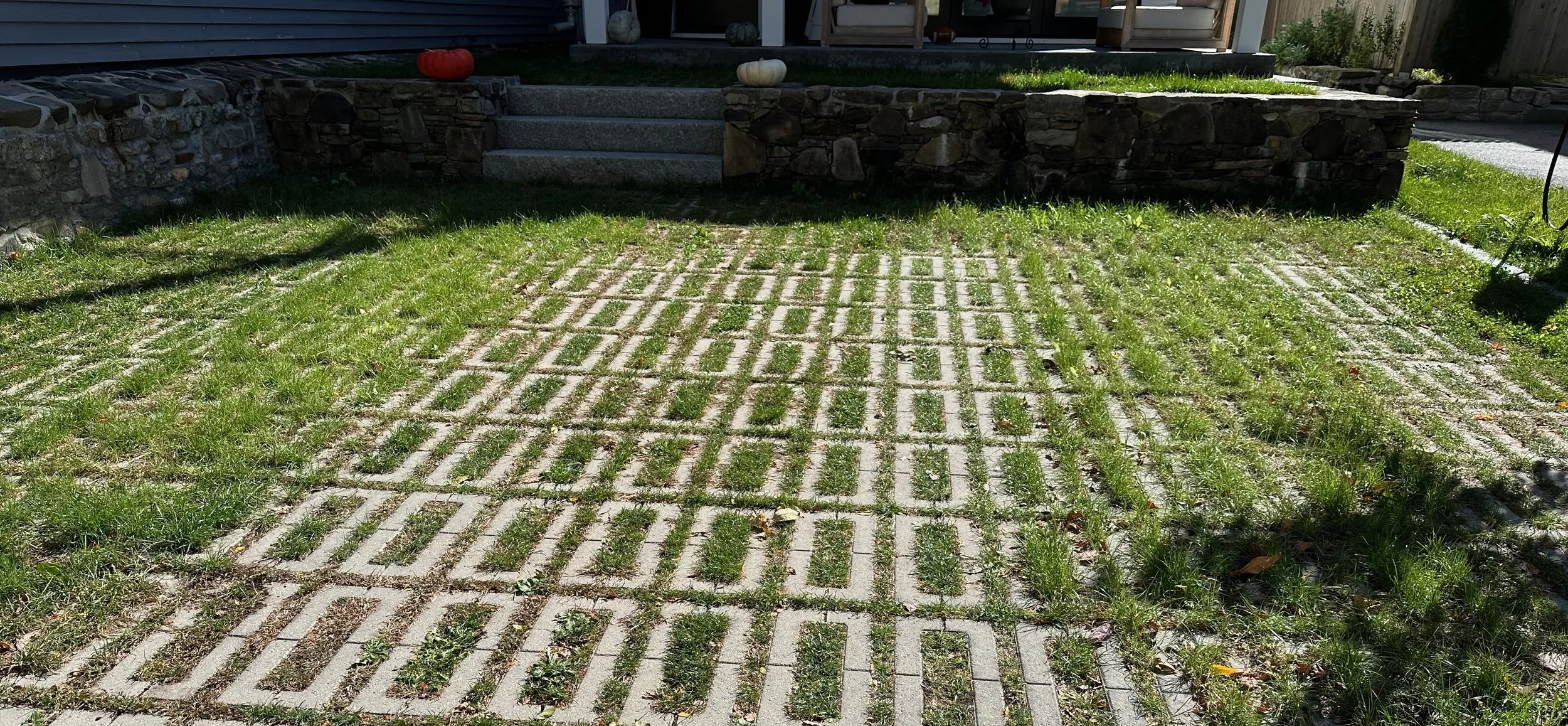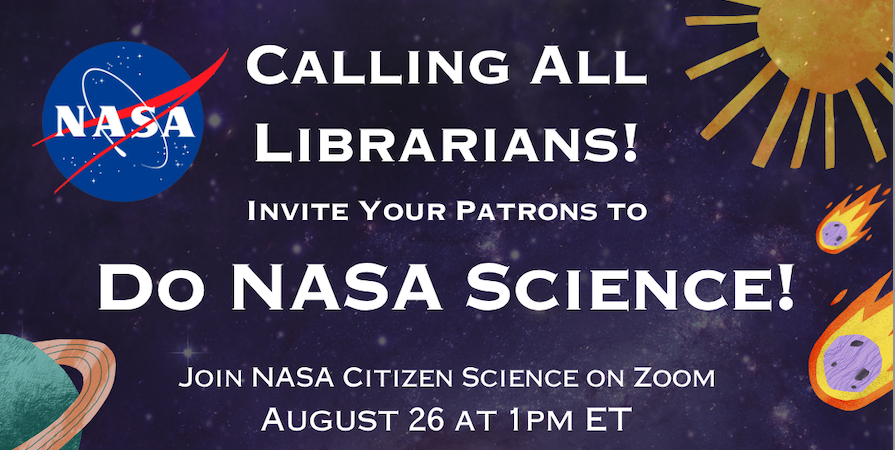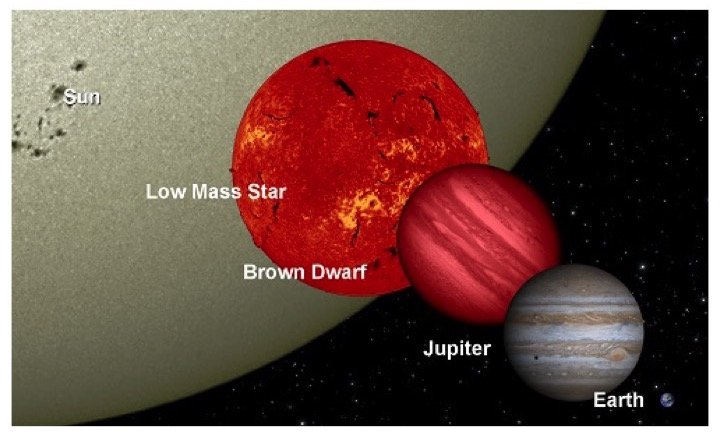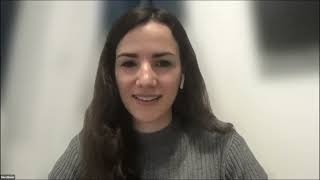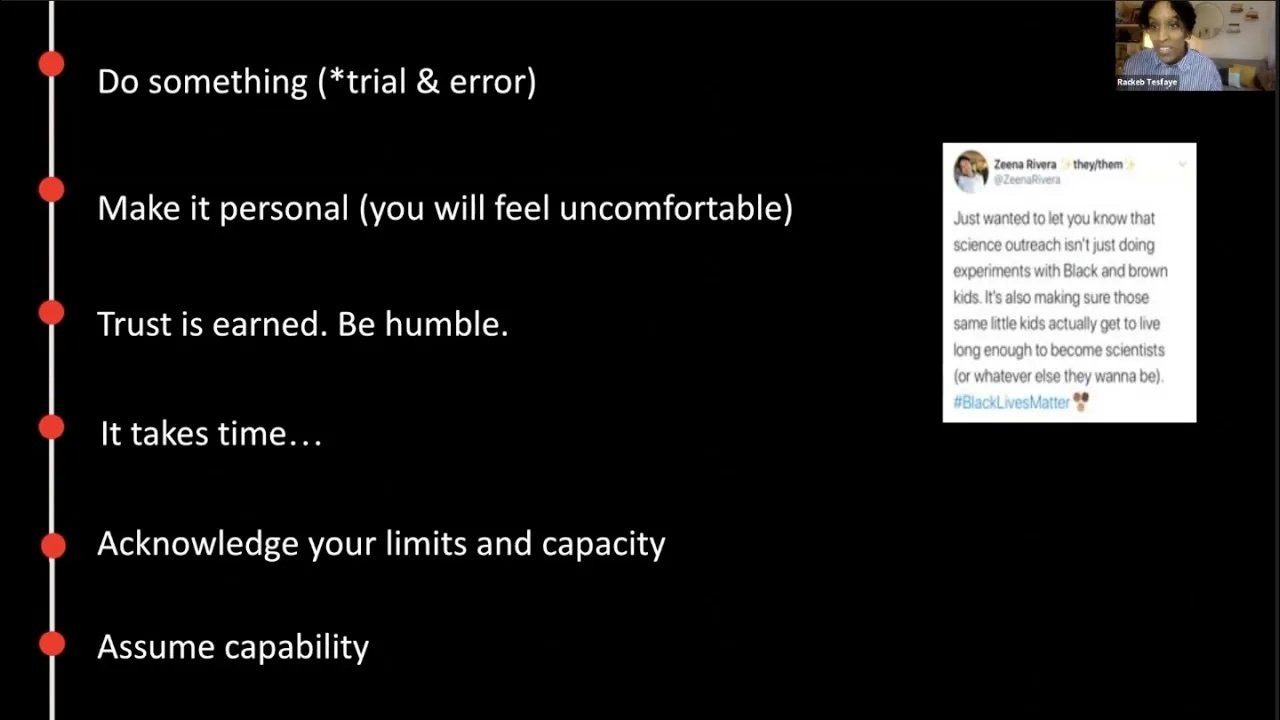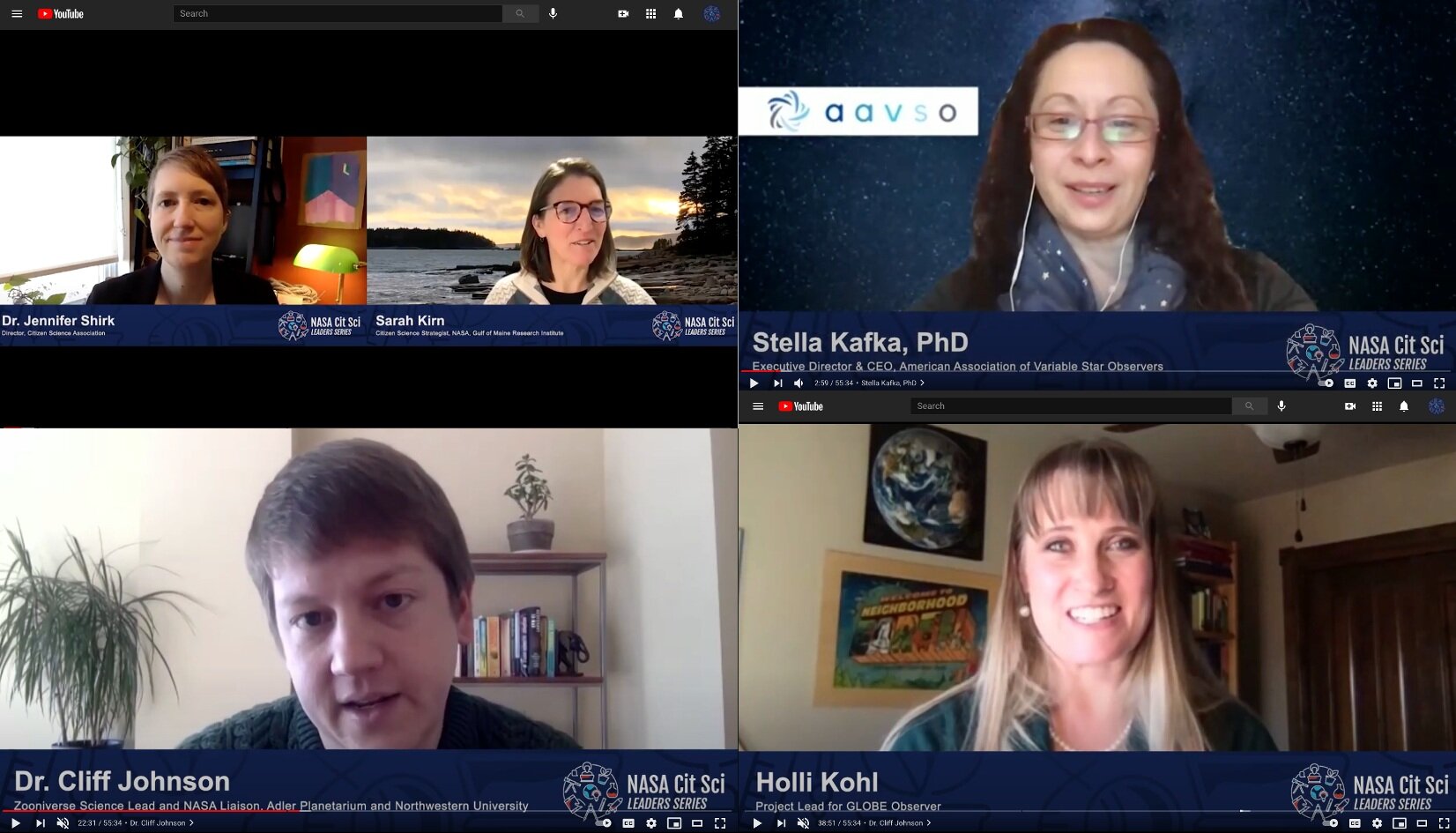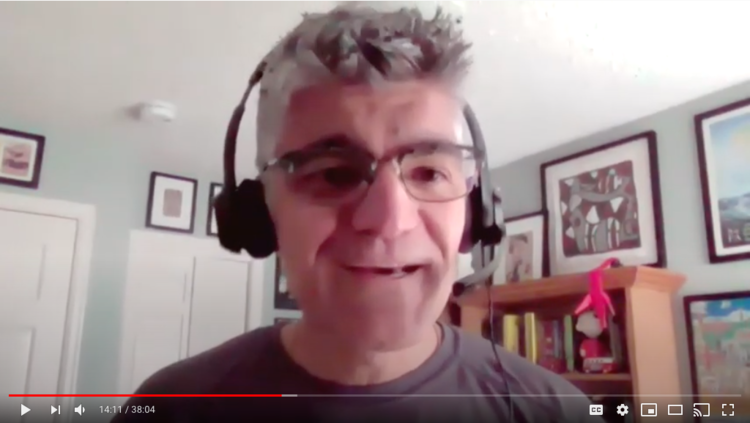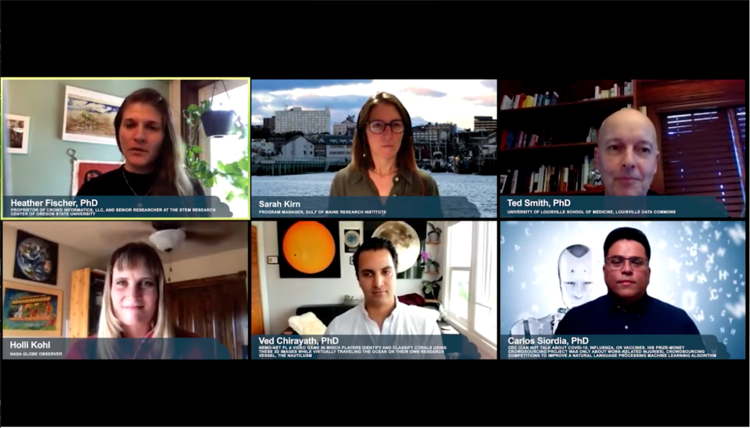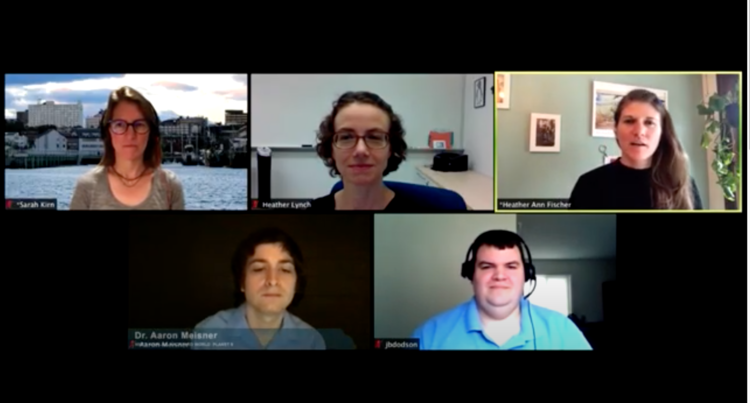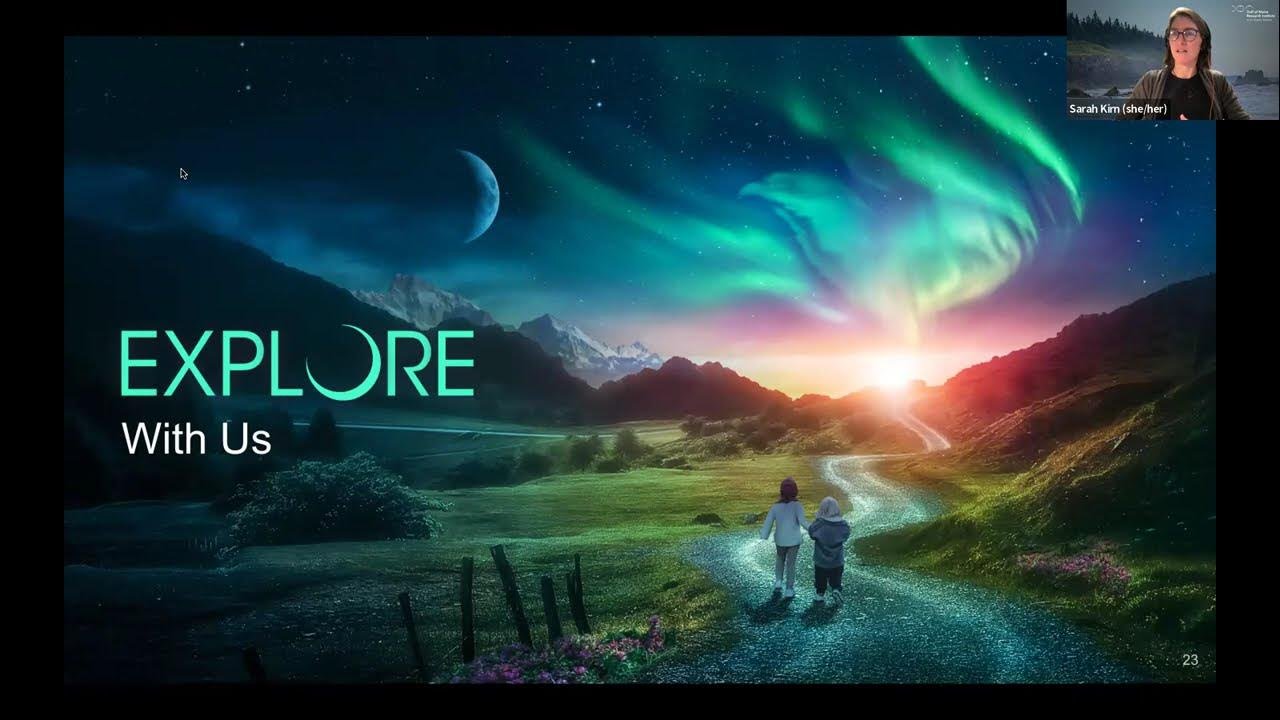
Recordings & Resources
Search our archive of recorded events and resources, or use the links below to jump to a particular collection.
Latest Series:
2025 Project Leaders Learning Series
Recordings and Resources by Category:
Working with advanced volunteers
How do I work with volunteers?
Inspire me! Stories from the field.
What technology is available to support my project?
What is different about citizen science data?
Where do I find project funding?
Other
Search the site (recordings, resources, and blog):
Search by keyword, name, idea, or theme.
2025 Project Leaders Learning Series
No matter where you are in your project’s lifecycle or whether you are on a custom or shared platform, this conversation with leaders from six commonly used platforms will give you insights, ideas, or inspiration for your project’s next steps.
Join us for an introduction to NASA citizen science projects and a suite of digital tools to help you host a NASA Citizen Science Event in your library.
Join us to reflect on what you learned at this conference, or to hear what you missed. Starts noon ET. Register here.
Listen and learn about space biology, the impressive accomplishments and ambitious goals of these working groups, and a model of citizen science that centers not on a single research question, but on a scientific resource.
Web analytics is the process of collecting and analyzing data to reveal visitor traffic and engagement patterns on webpages. But what tools are available, and how does a busy citizen science team make best use of them? Watch to learn the basics.
Funding:On March 13 Dr. Josh Pepper, a Program Officer from NASA’s Astrophysics Division will explain the landscape of different proposal calls and share insights on how share insights on how solicitations are written, how proposals are reviewed, and how funding is handled.
OpenData Management plans and long-term archives of citizen science project data: On March 6 Dr. Steven Crawford who leads NASA’s Open Science work will discuss these issues and more.
ArtificialIntelligence in practice: On February 20 the Zooniverse’s Dr. Laura Trouille joined us to share new functionality of the Zooniverse platform, including ways that Zooniverse projects are adjusting to work with new Artificial Intelligence/ machine learning tools.
There’s a special collection on The Future of Artificial Intelligence and Citizen Science in the journal Citizen Science Theory and Practice. Our February 6 event featured the editorial team, which was led by Zooniverse’s own Dr. Lucy Fortson.
Working with advanced volunteers
Join us to hear from pairs of scientists and citizen scientists who have co-authored peer-reviewed research publications and hear their recommendations on structures and practices to help ensure your success.
Listen in on a whirlwind tour - presented by scientist and citizen scientist pairs - of some of the beyond-the-norm contributions by citizen scientists, and the project structures and practices that you can use in your project to invite these extraordinary contributions.
NASA citizen science, like NASA science, is focused on scientific discovery -- preferably breakthrough discoveries that lead to peer reviewed publications. How can you set the stage for your citizen scientists to generate or contribute to out-of-the-box ideas that take science in new directions? NASA’s own Citizen Science Officer will share the strategies that have made a difference in his projects.
How do I work with volunteers?
Web Description:
Women hold up half the sky… but they don’t show up in these numbers in NASA-sponsored astrophysics projects. Why is this? And what can be done to welcome women when they do join projects?
Why do they do it? Motivations of paid and unpaid participants, PLUS a preview of Drafty, a collaborative database management tool. With Shaun Wallace, Assistant Professor of Computer Science leading the Human-Centered Experiential Technologies Lab (HAX) at University of Rhode Island; and Veselin Kostov, Planet Patrol.
“Inclusive science communication” was defined in a 2020 report by the Metcalf Institute at the University of Rhode Island as “any effort to engage people in science, tech, engineering, math and medicine that is grounded in inclusion, equity, and intersectionality.” Drawing on lessons and examples from the first events in this series, we will consider strategies for making NASA citizen science project communications more inclusive. Click image for more details.
Connecting with audiences underrepresented in your citizen science project is often best accomplished in partnership with an organization or leaders who are part of or deeply familiar with that new audience. We will talk about how to identify and approach potential partners, and hear stories from citizen science colleagues about their work to reach new participants through organizational partnerships. Click image for more details and links to resources.
In this workshop guest speakers Lila Higgins and Miguel Ordeñana, the co-leaders of Community Science at the Natural History Museum of Los Angeles County, will share from their learning and efforts since the 2020 #ShutDownSTEM event. Click on image for details and links to recommended pre-event reading.
Speakers will share insights on strategies to give new volunteers the knowledge and skills they will need to be helpful to your project and concurrently motivate and deepen their participation. Speakers will address the interrelated challenges of developing skills, deepening understanding of science, and building comfort in the social practices of projects.
Whether your goal is to attract more project volunteers or to welcome a more diverse volunteer pool, how you present your project online can help or hinder. Hear inspiring stories from NASA project leaders who are working on these goals, and concrete suggestions on web communications from NASA’s own Citizen Science Communication Officer.
One of the win-win aspects of citizen science is the opportunity to support public science learning. As people engage in the process of science, they learn – don’t they? This panel features experts sharing how to design for learning – starting with naming specific goals, and working through ideas to measure outcomes.
What citizen science projects accomplish and who participates in them has everything to do with how projects and their outreach efforts have been designed. This panel features program designers and design researchers discussing strategies to realize project ambitions.
Citizen science projects have demonstrated promise for engaging new audiences in the practice of science. Sometimes this is accomplished by engaging new audiences in existing investigations, sometimes by developing new investigations based on questions arising from communities typically underrepresented in science. This panel will showcase leaders dedicated to engaging underrepresented communities in citizen science.
Inspire me! Stories from the field.
Join us to reflect on what you learned at this conference, or to hear what you missed. Starts noon ET. Register here.
Listen and learn about space biology, the impressive accomplishments and ambitious goals of these working groups, and a model of citizen science that centers not on a single research question, but on a scientific resource.
Stardust@home was one of the first NASA research projects to engage citizens in space discovery. Through six project phases, Stardust@home has engaged thousands of “Dusters” and found precious interstellar particles. Dr. Westphal reflects on the first 14 years of the project and looks ahead to the future of collaborative interstellar particle research.
Posted In: Summer of Citizen Science 2020
Tagged: Stardust@home, Dr. Andrew Westphal
Dr. Parrish shares insights gleaned from a decades-long citizen science project, including the merits of training and practice, proven strategies for engaging and retaining volunteers, and the essential value of getting to know project volunteers.
Dr. Raj Pandya directs AGU’s Thriving Earth Exchange, which connects scientists and communities to enable collaborative efforts to design and lead science to addresses community priorities. In this keynote Dr. Pandya shares his vision for how the sciences can be more engaging, how inclusivity contributes to scientific innovation and societal relevance, and how the sciences can be allies in advancing equity in society.
What technology is available to support my project?
No matter where you are in your project’s lifecycle or whether you are on a custom or shared platform, this conversation with leaders from six commonly used platforms will give you insights, ideas, or inspiration for your project’s next steps.
Web analytics is the process of collecting and analyzing data to reveal visitor traffic and engagement patterns on webpages. But what tools are available, and how does a busy citizen science team make best use of them? Watch to learn the basics.
ArtificialIntelligence in practice: On February 20 the Zooniverse’s Dr. Laura Trouille joined us to share new functionality of the Zooniverse platform, including ways that Zooniverse projects are adjusting to work with new Artificial Intelligence/ machine learning tools.
There’s a special collection on The Future of Artificial Intelligence and Citizen Science in the journal Citizen Science Theory and Practice. Our February 6 event featured the editorial team, which was led by Zooniverse’s own Dr. Lucy Fortson.
Hear from six commonly used web platforms hosting participatory science projects in North America: CitSci.org; Zooniverse; FieldScope; Anecdata; iNaturalist; and GLOBE Observer. While we briefly about platform updates and future plans, the program is primarily a discussion of the kinds of research and participant experiences best supported by each. No matter where you are in your citizen science project’s life cycle, this conversation will help inspire your project’s next steps.
Machine learning and artificial intelligence technology are already being used to relieve the tedium or verify results from citizen science, with sometimes surprising results. Panelists share what they have learned about how to effectively marry citizen and machine efforts and what new technology is on the horizon.
What is different about citizen science data?
OpenData Management plans and long-term archives of citizen science project data: On March 6 Dr. Steven Crawford who leads NASA’s Open Science work will discuss these issues and more.
Keynote address by Dr. Andrea Grover, Associate Professor in Information Systems & Quantitative Analysis at the University of Nebraska at Omaha College of Information Science & Technology.
What are the best practices for handling citizen science data sets? What practices help assure quality and appropriate downstream use? How do you best comply with new NASA data management plan requirements? What is open data? Learn from NASA and other experts how to tackle these and other data and metadata related questions.
Citizen science efforts are frequently used to groundtruth or analyze remotely collected data, with impressive results in fields as diverse as archeology to climatology. On the flip side, citizen scientists have amassed impressive data sets of observations. Panelists share how their work integrates citizen scientist-collected data and remotely sensed data to unlock new understanding and discovery.
Where do I find project funding?
Funding:On March 13 Dr. Josh Pepper, a Program Officer from NASA’s Astrophysics Division will explain the landscape of different proposal calls and share insights on how share insights on how solicitations are written, how proposals are reviewed, and how funding is handled.
60-minute program plus 30-minute informal discussion
Program managers from six federal agencies (NOAA, NSF, EPA, NASA, USFS, and NIEHS) share how citizen science is strategically positioned in their agencies and the funding mechanisms that support it. Historical context provided by Alison Parker of the Wilson Center.
Presentations by Dr. Max Bernstein on NASA’s Research Opportunities in Space and Earth Sciences solicitation and by Dr. Woody Turner on the history of NASA funding for citizen science.
What belongs in a citizen science budget? A presentation and discussion.
Other
No matter where you are in your project’s lifecycle or whether you are on a custom or shared platform, this conversation with leaders from six commonly used platforms will give you insights, ideas, or inspiration for your project’s next steps.
Join us for an introduction to NASA citizen science projects and a suite of digital tools to help you host a NASA Citizen Science Event in your library.
Speakers will share insights on strategies to give new volunteers the knowledge and skills they will need to be helpful to your project and concurrently motivate and deepen their participation. Speakers will address the interrelated challenges of developing skills, deepening understanding of science, and building comfort in the social practices of projects.

